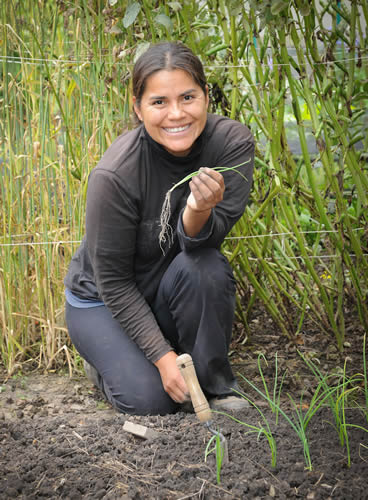To Be Happy, Play in the Dirt
By Alexandra Schiller, Coquille, OR

Susana, six-month intern in 2014
PHOTO CREDIT: CYNTHIA RAISER-JEAVONS
Gardeners are generally happy people, and the results of a scientific study may explain why. We all know that soil is the habitat for billions of bacteria, fungi and other microbes that support plant life. But British researcher Christopher Lowry focused on one particular nonpathogenic species, Mycobacterium vaccae. Dr. Lowry's animal studies showed that when Mycobacterium vaccae is injected into the windpipe, the brain triggers serotonin and norepinephrine-producing neurons.
Serotonin is a hormone-like neurotransmitter that eases tension, strengthens the immune system, and elevates mood. Low levels of serotonin lead to depression, anxiety, immune deficiencies and sleep disorders. Synthesized serotonin is an ingredient in many antidepressant drugs, but it can have harmful side effects. Dr. Lowry calls Mycobacterium vaccae a "Prozac without the side effects," that acts as a natural antidepressant when inhaled or ingested.
Norepinephrine is a major stress-combating hormone released from the adrenal glands. Although short-lived, it promotes alertness, helping us to think and act more quickly.
Thus, when we dig in the earth, we release and breathe in Mycobacterium vaccae particles that enter our body, quicken our senses and give us a feeling of bliss.
top | Newsletter Home | Article Index | Archive

|



